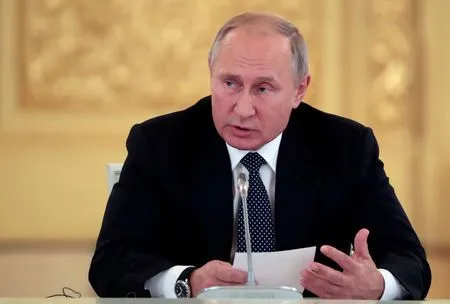Tuyên bố này của Tổng thống Nga đưa ra sau khi Mỹ rút khỏi hiệp ước kiểm soát vũ khí từ thời kỳ Chiến tranh lạnh.
Phát biểu trong họp báo sau khi có cuộc đối thoại với Thủ tướng Italia Giuseppe Conte, ông Putin nói muốn thảo luận về vấn đề tại sao việc Mỹ rút khỏi Hiệp ước loại bỏ tên lửa tầm ngắn và tầm trung (INF) của Tổng thống Donald Trump là nguy hiểm.
Hai nhà lãnh đạo dự kiến có cuộc hội đàm tại Paris vào ngày 11/11 tới đây.

Tổng thống Nga Vladimir Putin. Ảnh: Reuters
Trước đó, Nga đã lên tiếng nói rằng quyết định này của Mỹ là nguy hiểm, Tổng thống Trump cũng đáp trả bằng việc nói Nga vi phạm hiệp ước, mà Nga đã bác bỏ cáo buộc này, cho rằng phía Mỹ mới là phía vi phạm.
Cố vấn an ninh quốc gia Mỹ John Bolton trong cuộc gặp hôm thứ ba 23/10 phát biểu rằng, Washington muốn thúc đẩy kế hoạch rút khỏi hiệp ước này bất chấp sự phản đối từ Moscow và một vài nước Châu Âu.
Putin nói thêm, Nga sẽ có hành động đáp trả y như vậy và ngay tức khắc một khi Mỹ thực thi quyết định. Tổng thống Nga đặt ra câu hỏi liệu Mỹ sẽ làm gì với các tên lửa tầm ngắn và trung này sau khi rút khỏi INF và nếu Mỹ chuyển giao cho Châu Âu thì Nga sẽ có hành động đáp trả, và khi đó quốc gia nào chấp nhận các tên lửa này sẽ tự đặt mình vào nguy cơ hứng chịu đòn phản công.
Ông Putin nói thêm rằng không mong muốn đẩy Châu Âu vào tình thế này.
Quan chức cấp cao của NATO cũng trong ngày 24/10 đã đổ lỗi cho Nga đã phá vỡ hiệp ước, nhưng cũng nói rằng ông không tin lời cảnh cáo của Nga sẽ dẫn đến một hoạt động triển khai tên lửa Mỹ ở Châu Âu.
Nga có quyền triển khai tên lửa trên vùng đất giáp lãnh thổ Châu Âu là Kaliningrad, khi đó một loạt quốc gia Châu Âu sẽ trong tầm ngắm.
Tổng thống Nga lo sợ thế giới có thể bị cuốn vào một cuộc chạy đua vũ trang và lo lắng cho số phận của một hiệp ước khác về kiểm soát vũ khí là START, được thông báo sẽ hết hạn vào năm 2021.
Russia will target European countries if they host US nuclear missiles: Putin
(Reuters) - President Vladimir Putin said on Wednesday that Russia would be forced to target any European countries that agreed to host U.S. nuclear missiles following Washington's withdrawal from a landmark Cold war-era arms control treaty.
Speaking at a news conference after holding talks with Italian Prime Minister Giuseppe Conte, Putin said he wanted to discuss what he called dangerous U.S. plans to leave the Intermediate-Range Nuclear Forces (INF) Treaty with U.S. President Donald Trump.
The two leaders are expected to hold talks in Paris on Nov. 11.
Russia has called Trump's decision to quit the 1987 treaty, which eliminated both countries' land-based short- and intermediate-range ballistic missiles from Europe, dangerous. Trump has accused Russia of violating the treaty, something Moscow denies. It says Washington is the one violating it.
U.S. National Security Advisor John Bolton told Putin on Tuesday that Washington would press ahead with plans to quit the pact despite objections from Russia and some European countries.
Putin told reporters on Wednesday that Russia would have to respond in kind and would do so swiftly if the United States quit the pact.
"Answering your question directly, can we respond," Putin said, when asked what Russia would do if Trump made good on his pledge to leave the treaty. "We can, and it will be very fast and very effective," he said.
"If the United States does withdraw from the INF treaty, the main question is what they will do with these (intermediate-range) missiles that will once again appear.
"If they will deliver them to Europe, naturally our response will have to mirror this, and European countries that agree to host them, if things go that far, must understand that they are putting their own territory at risk of a possible counter-strike."
LOOMING ARMS RACE
Putin said he did not understand why it was necessary to put Europe in such danger, saying it was a situation that Russia itself wanted to avoid if possible.
NATO's top official on Wednesday blamed Russia for breaching the treaty, but said he did not believe the Russian threat would lead to new deployments of U.S. missiles in Europe.
Russia has the option of deploying intermediate-range missiles in its European exclave of Kaliningrad on the Baltic Sea, a move that would put a swath of Europe in range.
Putin said he feared the world might be about to slip into an arms race, saying the fate of another U.S.-Russian arms control treaty - the new START pact - which governs strategic nuclear missile launchers and is due to expire in 2021, was also unclear.
"If all this is dismantled, then nothing will be left when it comes to limiting the increase in arms," said Putin. "And then the situation will be, in my view, extremely dangerous. All that will be left is an arms race."


